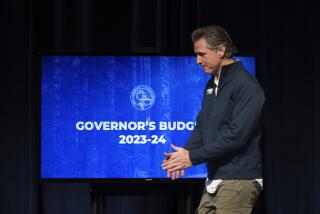Honeymoon Budget
- Share via
Congress’ willingness to grasp George Bush’s extended hand of cooperation will receive a crucial test on Feb. 9, when the President unveils his own budget for the year beginning in October. Bush already has set his Administration off in a fresh direction in style. But if there is to be a true bipartisan approach to the most critical national problems like the budget deficit, style must be supported by substance. The Bush budget will give the nation the first comprehensive look at how his priorities will differ from Ronald Reagan’s.
Bush proposed to be the education President, to be an environmentalist, to initiate programs like child care and to cut the capital-gains tax. At the same time, he vowed not to raise any taxes. The question is: Can he deliver on his promises and still keep the 1990 budget deficit within the $100-billion target of the Gramm-Rudman deficit-reduction law? The puzzle is not simplified by the need for savings-and-loan industry bailout funds and a start on the cleanup of nuclear-weapons and -research plants.
There is considerable hope in Congress that Bush will relax his no-new-taxes pledge with new forms of revenue going under the guise of user fees or some other euphemism. But for Bush to abandon his promise so early in the game would undermine his credibility.
There are hopeful signs of budget accommodation. The Bush team will achieve some savings by trimming back on Reagan’s proposed defense spending. It could launch some new programs on a symbolic basis, with token down payments for the first budget year. It is taking a more realistic view of economic performance. And Bush already has signaled a willingness to find new revenue to shore up the savings-and-loan industry.
Many experts believe that the new Administration can weather its first budget year without new taxes and still meet the Gramm-Rudman targets. But the 1991 budget year will be more difficult because Gramm-Rudman requires a deficit reduction of more than $60 billion. The obvious solution is to go for a tax increase in the second year of the Bush Administration.
But there is another congressional election in 1990, and Congress abhors tax increases in election years. To some it may seem that Congress and the Administration are headed for gridlock, just as in the Reagan years. This is the testing ground for the new spirit of cooperation. Real negotiation with a commitment to deficit reduction, not just political posturing, could lead the way out of the thicket. Chairman Leon E. Panetta (D-Monterey) of the House Budget Committee already has suggested the broad outlines of a possible solution.
In an address to the National Press Club, Panetta recalled the success of the budget agreement that followed the October, 1987, stock-market crash, and said that it could serve as an example of what can be done in the coming year. The compromise involved a mix of savings in defense and entitlement programs and new revenues. The fact that the agreement stretched over two years, Panetta said, “helped restore a timely budget process to the country for the first time in 40 years.” Panetta said that he is encouraged by the initial actions of the Administration. But the Feb. 9 budget message will be a major test. Panetta said that the budget will be judged by whether it is specific, realistic, credible and fair.
That is a reasonable test for any national budget, which is the major vehicle that an Administration uses in setting priorities. If Bush presents a budget that meets the Panetta criteria, the new era of the extended hand will continue. If not, Washington could write a quick end to a sweet but brief Bush honeymoon.
More to Read
Get the L.A. Times Politics newsletter
Deeply reported insights into legislation, politics and policy from Sacramento, Washington and beyond. In your inbox twice per week.
You may occasionally receive promotional content from the Los Angeles Times.










